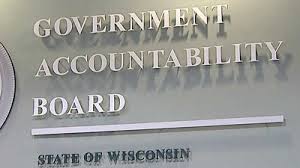GAB still reviewing court ruling declaring WI campaign finance law unconstitutional

By M.D. Kittle | Wisconsin Reporter
MADISON, Wis. — An official with the state Government Accountability Board says the agency is still reviewing last week’s ruling by the 7th Circuit U.S. Court of Appeals that declared unconstitutional portions of state campaign finance laws restricting issue advertising.
“The Board is reviewing the decision of the Court of Appeals and will consult with the (state) Department of Justice regarding it as we await a follow-up order from the District Court,” said Reid Magney, spokesman for the GAB, which oversees state campaign and elections law.
Dana Brueck, spokeswoman for Attorney General J.B. Van Hollen, said the DOJ had no comment Tuesday on potential changes to the laws.
UNDER REVIEW: An official with the Government Accountability Board says the state agency continues to review the 7th Circuit U.S. Court of Appeals’ ruling last week declaring portions of Wisconsin campaign finance law unconstitutional.
Late Wednesday, the appeals court issued an 88-page decision siding with Wisconsin Right to Life Inc. and its state political action committee. The organizations sued to block the enforcement of multiple state statutes and rules against groups that spend money for political speech independently of candidates and parties — so-called issue advocacy groups.
In short, the court, in a 3-0 decision, found the state’s corporate-speech ban, the ban on political spending by corporations, unconstitutional under the U.S. Supreme Court’s 2010 Citizens United ruling that opened up previous restrictions on political speech. The appeals vourt remanded the case to the district court to issue a permanent injunction consistent with the opinion.
The court also ruled:
- The cap on the amount a corporation may spend on fundraising for an affiliated political committee, is unconstitutional.
- The lengthy disclaimer requirement under state Government Accountability Board’s regulation is unconstitutional as applied to 30-second radio ads and ads of shorter duration.
- The statutory definition of “political purposes,” section 11.01(16), and the regulatory definition of “political committee,” GAB § 1.28(1)(a), are unconstitutionally vague and overbroad in the sense meant by federal court precedent. As applied to political speakers other than candidates, their campaign committees and political parties, the definitions are limited to express advocacy.
In its pointed decision, the court rebukes the state Legislature for failing to act in clarifying what it sees as Wisconsin’s “labyrinthian”campaign finance laws — four years after the Citizens United ruling. The system is “difficult to decipher without a background in this area of law,” the ruling states.
The court also took aim at the Government Accountability Board’s interpretation of the state’s “vague” campaign finance law, according to election law expert, Benjamin Barr.
“I think the GAB to blatantly ignore the pretty strong standards set out by Citizens United, it’s really unfathomable,” the campaign finance expert said. “It’s as if they decided Citizens United didn’t exist and they are making a mockery out of the rule of law and perverting the First Amendment. It’s hard to describe that as oversight on their part.”
In the wake of growing concerns about the legality of a secret John Doe probe into conservatives, Republican lawmakers are calling for a review of the GAB — particularly examining the agency’s role in the politically charged investigation.
“After seeing these activities in conjunction with the John Doe, I think this government needs to review GAB, get some answers, and consider reforms, if necessary, in the next legislative session,” state Sen. Tom Tiffany, R- Hazelhurst, told Wisconsin Reporter earlier this month.
Tiffany said it’s too early to determine if reforms are needed at the GAB, but he said a closer look into the agency is warranted.
Magney said the GAB is “always prepared and willing to work with the Legislature to review and update Wisconsin’s campaign finance laws.”
“We look forward to doing so and will provide any assistance that we can, as we have offered in the past,” the spokesman said.
Contact M.D. Kittle at mkittle@watchdog.org







